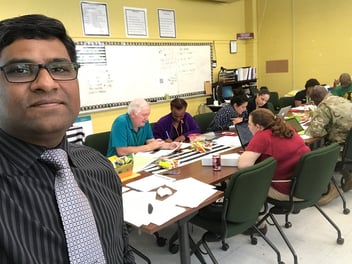Graduation Spotlight: From paraprofessionals to qualified teachers in West Baton Rouge

So when you give Louisiana a problem, the same originality that carries everything else goes into solving it. Like the rest of the country, The Pelican State is searching for answers to teacher shortages. Problems can present new opportunities, however, and the situation is allowing service-minded community members to become certified teachers: to earn their elusive degree, a long time coming, without any debt.
Reach University’s first graduating cohort features five graduates from Louisiana, each of them non-traditional in some way or another, and each of them able to effectively manage job-embedded coursework within the framework of their demanding lives. Reach is an online university focused on affordable teacher education, allowing schools to turn to the community itself as a pipeline to fill these urgent positions of need: parents, bus drivers, custodians, anyone.
The five Louisiana graduates, Kendra Kahao (West Baton Rouge, Caneview Elementary), Janae Montgomery (West Baton Rouge, Brusly High School), Evy Rodrigue (Assumption, Labadieville Middle School), Crystal Knope (St. Mary, Wyandotte Elementary), and Theresa Rodriquez (St. Mary, Maitland Elementary) are all now holding bachelor’s degrees. Again: debt-free.

“When I first heard about Reach, I said there was no way that could work at my age,” Rodriquez explains. “I hadn’t been to school since 1992. Now I just graduated at 50 years old.”
“Too good to be true,” Montgomery adds. “That’s what I said, too. There’s no way this works with everything else. There’s no way it’s this affordable.”
No way? Montgomery inevitably gave the commencement address. In her speech, she explained how graduation has brought those initial hesitations full circle: “In 2020, we were in the middle of a worldwide pandemic, in the midst of life’s uncertainties, we found ourselves beginning a new pathway, and the next step on our educational journey. Many of us were apprehensive, nervous, and questioning that leap of faith. But I would not want to do this with any other group of people.”
Louisiana’s culture is very much driven by hospitality and service to others. That said, Montgomery went on to thank her classmates for not blocking her phone number. The group has relished in the community aspect of their non-traditional college experience. This is definitely a running character trait in Louisiana: help being ready, and available as soon as it's needed.
The Reach grads are no different.
“Louisiana is a place,” Rodrigue explains, “where your friend’s mom would know your grandma, your momma, her siblings, and all your cousins, after a one night sleepover.”
“You can still go to your neighbors to ask for eggs here,” Montgomery says.

Across the state, the call to serve in the classroom is being answered. In the 2022-23 school year, Reach University’s approximately 1,000 Louisiana candidates worked in 84% of all Louisiana parishes. In neighboring Arkansas, Reach is now partnered with 100% of all educational service cooperatives. Most of these teacher candidates are low-income, first generation college students, and many of them are working parents. Reach classes meet twice a week, and the coursework is job-embedded.
The apprenticeship degree model offers the same upward mobility as a traditional bachelor’s degree, but it does so at a fraction of the cost. With tuition priced at just $75 per month, the entire first cohort was able to graduate this summer without any debt.
The people who care most are being given a chance to not only make a difference, but to achieve long sought-after career goals.

Kahao was on her own in life by age seventeen, and made her way through years of various restaurant and hospitality management experiences. Now a college graduate, she’s thrilled to have put that life in the rearview mirror. “I had to support myself,” she explains. “But I got pretty sick of teaching young workers how to say ‘salmon’ and ‘merlot’ correctly. Plus, it was important to me to get my degree as an example to my daughters. How am I going to be able to tell them they need to go to college?”

Again, it’s not just that each candidate was able to reach their goal. The graduates are also grateful for the bonding experience of the challenge. Each is quick to credit the others for getting to the finish line.
“It’s good to have someone to vent with,” Rodriquez explained, speaking of Knope. The two work at different schools in St. Mary Parish. “We feed off one another, try to understand things together. It’s important to have family support, but they don’t get it like she gets it.”
“There were a lot of days when we felt like quitting,” Knope says. “But we didn’t, and that’s why we’re sitting here today. It was really beneficial having her as a support system.”
“For real, I’m still just glad they didn’t delete my number,” Montgomery explains, speaking of Kahao and Rodrique. “I messaged about literally every single thing, trying to make sure I was doing things right. We built a little community, and now these people will be part of my life forever.”
These are the people rising to meet Louisiana’s hour of need. They are serving their communities while making new ones all their own.
Perhaps no better characterization of the spirit of service can be found outside of the example set by Evy Rodrigue. She is an adoptive mother of two children, and also has provisional custody of a third. She teaches swimming lessons, teaches at the church, and even finds time to be the softball coach at Labadieville Middle School. A true Assumption Parish rock star, Rodrigue’s degree, and life as a teacher, is the fulfillment of a childhood dream.
“I used to love helping my aunt set up her classroom when I was a kid,” she explains. “I loved doing that in the summer. I would take her teaching manuals home over summer break. So now my kids get to come in with me to help set up my classroom. They get to feel what I’ve been feeling all these years. And I get so much joy from that.”
Teacher shortages are a very real, and very unique, problem. But when the call to serve is received with joy, the answers to tough questions are often just down the road. A servant’s heart always has a puncher’s chance against the odds. That’s written on every daiquiri stand in Louisiana. So hands are going up, and names are being called.
%20(2).png?width=352&name=Interior%20Design%20Quote%20Instagram%20Template%20with%20Two%20Images%20and%20Website%20Link%20(Facebook%20Post)%20(2).png)
-1.png?width=352&name=U.S.%20DEPT.%20OF%20ED%20AWARDS%20REACH%20UNIVERSITY%20%26%20PARTNERS%20$9.9M%20TO%20RECRUIT%2c%20TRAIN%20LOUISIANA%20COMMUNITY%20COLLEGE%20GRADS%20TO%20BECOME%20LICENSED%20TEACHERS%20(2)-1.png)
